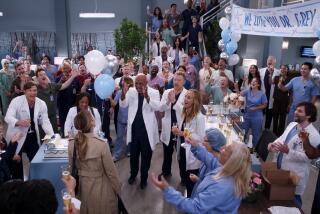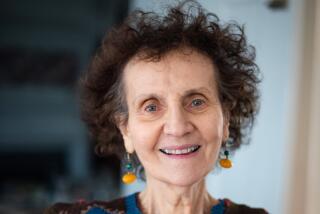Kathryn Fink; UCLA Medical School Pioneer
- Share via
Kathryn Ferguson Fink, who became an award-winning biochemist despite being told as a child that the erudition of science was beyond the grasp of young farm girls, died Tuesday at UCLA Medical Center.
She was 72 and most recently had been assistant dean for student affairs at UCLA School of Medicine.
Dr. Fink died of cancer, said her daughter, Suzanne Coppenrath.
Dr. Fink, born in State Center, Iowa, a hamlet of 1,000, had been honored with dozens of awards, among them UCLA’s 19th Woman of Science Award for being among the first on the faculty to become proficient in the use of radioactive “labels.” Those trace biochemical pathways and combine paper chromatography and radioautography in which an object or tissue is recorded by means of its radioactivity.
With her husband Robert, whom she met while both were graduate students at the University of Rochester in New York, she contributed to discoveries in the fields of thyroid biochemistry, amino acid and purine metabolism.
She had arrived at graduate school after settling on a career in chemistry allied with medicine, which she had first envisioned when a high school valedictorian in State Center. She recalled in 1971 that she was to become the first of the State Center girls to pursue a career in the sciences. Or any career at all, for that matter.
“(Women) teachers lost their contracts when they married,” she told The Times in conjunction with being honored as a Times Woman of the Year in 1971. “It was considered immoral to go on working after marriage. . . .”
Even at state university in Iowa she continued to navigate roadblocks. At one point her professors tried to change her chemistry major because she would not be able to find work when she graduated.
After graduate school and marriage, she and her husband not only managed a family of two daughters but worked together on a portion of the Manhattan Project at Rochester that helped develop the atomic bomb.
Head of the project there was Dr. Stafford Warren who later invited the Finks to join him when he became the first dean of the UCLA School of Medicine.
When they came to UCLA in 1947, technical facilities were non-existent, and for the next few years they had to conduct their experiments at nearby hospitals in the San Fernando Valley or Long Beach.
Their paper chromatography technique was adapted to determine if cancer patients undergoing chemotherapy were being helped.
In 1976 Dr. Fink became assistant dean for student affairs at the medical school and head of the UCLA Fellowship and Scholarship Committee of the School of Medicine.
In lieu of flowers her husband and daughters ask contributions to the Kathryn Fink Medical Scholarship Fund at the UCLA School of Medicine.
More to Read
Sign up for Essential California
The most important California stories and recommendations in your inbox every morning.
You may occasionally receive promotional content from the Los Angeles Times.













